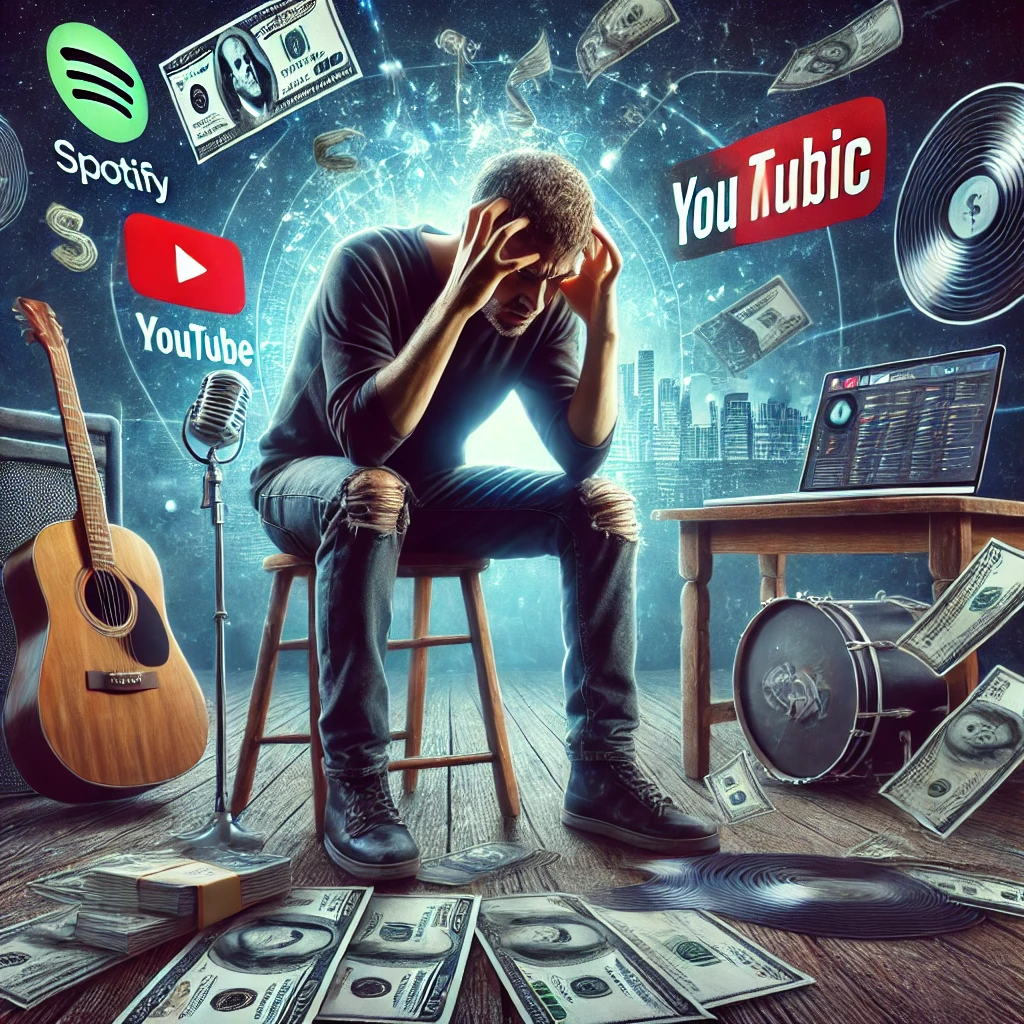In today’s digital age, sharing your music with the world has never been easier. Platforms like Spotify, Apple Music, and YouTube allow artists to reach global audiences with a few clicks. However, despite this unprecedented access, many musicians find themselves struggling to translate streams and likes into sustainable income. If you’re wondering why your musical passion isn’t paying the bills, here are some critical factors to consider.
The Streaming Conundrum
Streaming services have revolutionized music consumption, but they’ve also introduced a challenging revenue model for artists. While your tracks might garner thousands of streams, the financial return can be disheartening. Spotify, for instance, pays artists between $0.003 and $0.005 per stream. This means that even with a million streams, you’d earn between $3,000 and $5,000—a sum that might not cover production costs, let alone living expenses. Moreover, Spotify only pays artists with tracks that have at least 1,000 streams in the past year, leaving many without any compensation.
Solution: Diversify your income streams. Relying solely on streaming revenue is unsustainable for most artists. Consider supplementing your income with live performances, merchandise sales, licensing deals, and direct fan support through platforms like Bandcamp or Patreon.
The Pay-to-Play Dilemma
In an attempt to gain more visibility, some artists participate in programs like Spotify’s Discovery Mode, which offers algorithmic promotion in exchange for reduced royalty rates. While this might increase your track’s exposure, it further diminishes your earnings. Critics argue that such programs pressure artists into devaluing their work and create an uneven playing field, favoring those who can afford to take a financial hit for more exposure.
Solution: Build and engage with your fanbase organically. Utilize social media platforms, email newsletters, and live interactions to foster a loyal community. A dedicated fanbase is more likely to support you directly, attend shows, and purchase merchandise, reducing reliance on algorithm-driven platforms.
The Oversaturation Challenge
The democratization of music distribution means that thousands of new tracks are uploaded daily. This oversaturation makes it difficult for individual artists to stand out and gain significant attention.
Solution: Develop a unique brand identity. Authenticity resonates with audiences. Invest time in honing your unique sound, storytelling, and visual aesthetics. Collaborate with other artists, engage in your local music scene, and leverage niche communities that align with your musical style.
The Business Knowledge Gap
Many musicians focus primarily on their artistry, often overlooking the business aspects of their careers. Understanding contracts, royalties, marketing strategies, and financial management is crucial for building a sustainable career.
Solution: Educate yourself on music business fundamentals. Numerous resources, courses, and books are available that cover topics like music marketing, royalty collection, and financial planning. Alternatively, consider partnering with a manager or mentor who can provide guidance and support.
The Live Performance Predicament
Live performances have traditionally been a significant income source for artists. However, touring can be financially draining, especially for independent musicians. Expenses such as travel, accommodation, venue fees, and promotion often outweigh the profits, leading to financial strain. A recent study found that 72% of artists made no profit from recent tours, with 25% actually operating at a loss.
Solution: Strategize your live performances. Focus on local gigs to minimize travel expenses, collaborate with other artists to share costs, and consider virtual performances, which have lower overheads and can reach a global audience.
The Merchandise Misstep
Merchandise sales can be a lucrative revenue stream, yet many artists either overlook this opportunity or fail to offer appealing products.
Solution: Invest in quality merchandise that reflects your brand. Items like apparel, posters, and physical copies of your music can serve as both promotional tools and income sources. Ensure that your merchandise is easily accessible through your website and at live events.
The Licensing and Sync Opportunity
Licensing your music for use in films, TV shows, commercials, and video games can provide substantial income. However, many artists are unaware of how to navigate this sector.
Solution: Research and pursue licensing opportunities. Register your music with performance rights organizations (PROs) to ensure you receive royalties when your music is used commercially. Network with industry professionals, music supervisors, and consider hiring a licensing agent to help place your music in various media.
The SEO Shortfall
In an era where digital presence is paramount, not optimizing your online content for search engines can result in missed opportunities for discovery.
Solution: Implement basic SEO strategies. Use relevant keywords in your website content, song titles, and blog posts to improve your search engine rankings. For instance, if you specialize in indie folk music in Accra, terms like “Accra indie folk artist” can help local audiences find you more easily.
The Social Media Slip
While social media platforms are powerful tools for promotion, inconsistent or inauthentic engagement can alienate potential fans.
Solution: Develop a consistent and genuine social media strategy. Share behind-the-scenes content, interact with your followers, and provide regular updates about your music journey. Authentic engagement fosters a loyal community that is more likely to support your endeavors financially.
The Financial Management Flaw
Poor financial management can hinder your ability to reinvest in your music career. Many artists struggle with budgeting, tax management, and tracking expenses.
Solution: Treat your music career like a business. Keep track of your income and expenses, set aside money for taxes, and create a financial plan to ensure long-term stability. Consulting a financial advisor who specializes in entertainment can also be beneficial.
Final Thoughts
Making money from music is a challenge, but it is not impossible. Understanding the industry, diversifying your revenue streams, building a strong brand, and engaging meaningfully with your audience can significantly improve your financial success. By addressing these common obstacles and implementing strategic solutions, you can turn your passion for music into a sustainable career.


